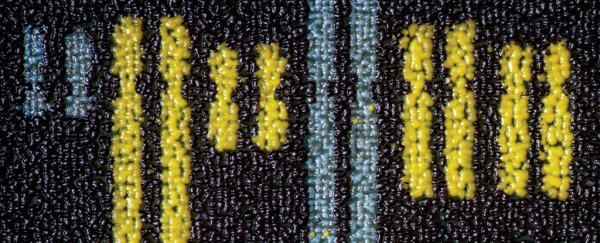Scientists have taken a major step forward in developing complex artificial life, by successfully synthesising six out of 16 yeast chromosomes – the molecular structures that carry genes.
This means they're more than one-third of the way to being able to build their own custom-made yeast genomes from scratch, which would be a huge moment in the field of developing lab-made lifeforms.
The research is being carried out by the hundreds of scientists who make up the Synthetic Yeast Genome Project, and they estimate that the artificial yeast genome could be completed within the next year.
"This is very exciting," geneticist George Church from Harvard University, who wasn't involved in the research, told Kristen V. Brown at Gizmodo.
"They have tackled some of the hardest things. The other two-thirds of the yeast genome is going to happen much, much faster."
In recent years, scientists have made great leaps in editing DNA thanks to CRISPR-Cas9 technology, enabling them to do things like stopping apples from browning, and preventing HIV reinfections by editing the virus out of human cells – but this time, the aim was to produce a complete single-celled organism in the lab.
To be clear, that end goal is still a long way off, but this research moves us a lot closer to it, as scientists are learning step by step how to effectively write the code that could create a functional artificial organism.
Something similar has been done before with the Mycoplasma genitalium bacterium, but the yeast genome here is far more complex.
If the team succeeds, it would be the first genome of a eukaryotic organism to be synthesised – the same domain of living things that animals and plants belong to, where cells contain a nucleus and other membrane-bound organelles.
The process involves building yeast chromosomes from the four chemical building blocks that make up DNA – adenine, cytosine, guanine and thymine. At each stage, natural chromosomes are carefully replaced with lab-made ones, and then the yeast is tested to see if it still functions as it should.
This is all made possible by an advanced computer program called BioStudio, with any 'bugs' in the code being identified and fixed before moving on to the next stage.
"We're essentially swapping out the code, if you will, in a living yeast cell with sort of a 21st century version of the operating system," project leader Jef Boeke, from the New York University School of Medicine, explained to NPR.
That process could eventually enable scientists to do much more than make their own yeast to order. It's hoped that future designer organisms could be used as tiny custom factories, pumping out drugs to treat disease and producing different types of biofuel.
One day, it might also enable us to develop completely different types of yeast that can survive in various environments, or with specific characteristics.
For now, the scientists aim to produce their own yeast chromosomes that work in the same way as natural ones, while adding some tweaks – such as swapping genes around to make the DNA easier to edit, and taking out any redundant code.
"A great quote from Richard Feynman of the Feynman lectures on physics is: 'What I cannot create, I cannot understand,'" Boeke told NPR. "And that's kind of a motto for our field, I guess you would say."
Seven papers on the research have been published in Science.
